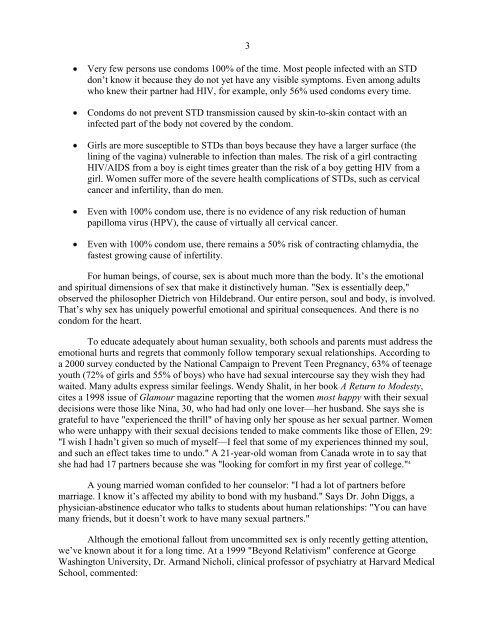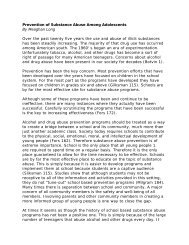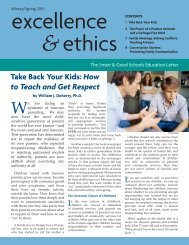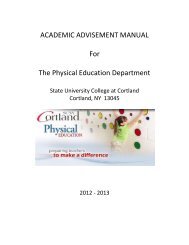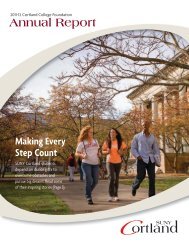How to Talk to Kids About Sex, Love, and Character
How to Talk to Kids About Sex, Love, and Character
How to Talk to Kids About Sex, Love, and Character
- No tags were found...
You also want an ePaper? Increase the reach of your titles
YUMPU automatically turns print PDFs into web optimized ePapers that Google loves.
3Very few persons use condoms 100% of the time. Most people infected with an STDdon‟t know it because they do not yet have any visible symp<strong>to</strong>ms. Even among adultswho knew their partner had HIV, for example, only 56% used condoms every time.Condoms do not prevent STD transmission caused by skin-<strong>to</strong>-skin contact with aninfected part of the body not covered by the condom.Girls are more susceptible <strong>to</strong> STDs than boys because they have a larger surface (thelining of the vagina) vulnerable <strong>to</strong> infection than males. The risk of a girl contractingHIV/AIDS from a boy is eight times greater than the risk of a boy getting HIV from agirl. Women suffer more of the severe health complications of STDs, such as cervicalcancer <strong>and</strong> infertility, than do men.Even with 100% condom use, there is no evidence of any risk reduction of humanpapilloma virus (HPV), the cause of virtually all cervical cancer.Even with 100% condom use, there remains a 50% risk of contracting chlamydia, thefastest growing cause of infertility.For human beings, of course, sex is about much more than the body. It‟s the emotional<strong>and</strong> spiritual dimensions of sex that make it distinctively human. "<strong>Sex</strong> is essentially deep,"observed the philosopher Dietrich von Hildebr<strong>and</strong>. Our entire person, soul <strong>and</strong> body, is involved.That‟s why sex has uniquely powerful emotional <strong>and</strong> spiritual consequences. And there is nocondom for the heart.To educate adequately about human sexuality, both schools <strong>and</strong> parents must address theemotional hurts <strong>and</strong> regrets that commonly follow temporary sexual relationships. According <strong>to</strong>a 2000 survey conducted by the National Campaign <strong>to</strong> Prevent Teen Pregnancy, 63% of teenageyouth (72% of girls <strong>and</strong> 55% of boys) who have had sexual intercourse say they wish they hadwaited. Many adults express similar feelings. Wendy Shalit, in her book A Return <strong>to</strong> Modesty,cites a 1998 issue of Glamour magazine reporting that the women most happy with their sexualdecisions were those like Nina, 30, who had had only one lover—her husb<strong>and</strong>. She says she isgrateful <strong>to</strong> have "experienced the thrill" of having only her spouse as her sexual partner. Womenwho were unhappy with their sexual decisions tended <strong>to</strong> make comments like those of Ellen, 29:"I wish I hadn‟t given so much of myself—I feel that some of my experiences thinned my soul,<strong>and</strong> such an effect takes time <strong>to</strong> undo." A 21-year-old woman from Canada wrote in <strong>to</strong> say thatshe had had 17 partners because she was "looking for comfort in my first year of college." 4A young married woman confided <strong>to</strong> her counselor: "I had a lot of partners beforemarriage. I know it‟s affected my ability <strong>to</strong> bond with my husb<strong>and</strong>." Says Dr. John Diggs, aphysician-abstinence educa<strong>to</strong>r who talks <strong>to</strong> students about human relationships: "You can havemany friends, but it doesn‟t work <strong>to</strong> have many sexual partners."Although the emotional fallout from uncommitted sex is only recently getting attention,we‟ve known about it for a long time. At a 1999 "Beyond Relativism" conference at GeorgeWashing<strong>to</strong>n University, Dr. Arm<strong>and</strong> Nicholi, clinical professor of psychiatry at Harvard MedicalSchool, commented:


